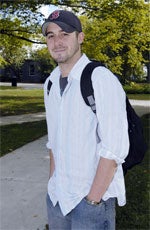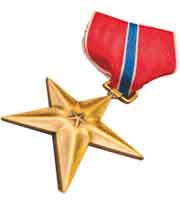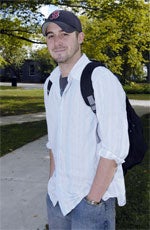 KINGSTON, R.I. — October 14, 2005 — Ryan Gallucci wears a Boston Red Sox cap, a big grin, and a metal bracelet engraved with the name of a soldier who was killed in action fighting in Iraq.
KINGSTON, R.I. — October 14, 2005 — Ryan Gallucci wears a Boston Red Sox cap, a big grin, and a metal bracelet engraved with the name of a soldier who was killed in action fighting in Iraq.
He had to put his education at the University of Rhode Island on hold in 2003 when, as a specialist in the U.S. Army 443 Civil Affairs Battalion out of Warwick, he was deployed to Iraq for nearly a year.
Although his commanders had put him in for the Bronze Star, he thought it was downgraded to an Army Commendation Medal, which he received at the end of his tour. “ARCOMs were basically given to everybody so I affectionately dubbed it my ‘thanks for coming’ medal,” he said.
Only recently, Gallucci discovered that he would receive a Bronze Star for extraordinary performance of duty in a hostile environment. He was officially awarded the medal during a ceremony last month.
“It makes you feel so much better. There’s such validity in getting the award,” the URI student says.
He joined the Army Reserves in 1999, right after graduating from High School. Serving in the armed forces is a family tradition. His grandfather served in the Navy, his father in the Army, his older brother, John, graduated from the U.S. Naval Academy in Annapolis, Md. (In fact, initially both brothers served in Iraq, John serving aboard the U.S.S. Roosevelt.)
Iraq was a mixed bag. “It was,” he says “a hell of a learning experience, but it gave me a better work ethic and a new world perspective. It made me see how the rest of the world lives and experience their way of life.”
The civil affairs unit acts as a liaison between the military and civilians to help reestablish order. Working with a six-person team, Gallucci was put in charge of restoring water, power, and public works. Although he didn’t know how to restore water, he was able to convert his knowledge of the summer in-ground pool jobs. “The filtration systems were just the same, only on a grander scale,” he says with a smile.
He oversaw the water treatment plant and electricity infrastructure rehabilitation in four Iraqi cities. He proposed, planned, coordinated and managed projects totaling over 4.7 million dollars.
He lived among the Iraqis, so if they didn’t have water, electricity or air conditioning, neither did his unit. During game number 7 of the 2003 World Series, he was on a base and able to watch the game on television. “Four of us Boston fans stayed up until 7 in the morning watching the Red Sox lose to the Yankees,” he said.
 His team encountered mortar rounds, small arms fire, rocket propelled grenades (one landed within five meters of him) and improvised explosives devices. Two of the team members were injured with shrapnel. Gallucci said he lived under the constant fear of death.
His team encountered mortar rounds, small arms fire, rocket propelled grenades (one landed within five meters of him) and improvised explosives devices. Two of the team members were injured with shrapnel. Gallucci said he lived under the constant fear of death.
He was instrumental in maintaining the security of headquarters during several protests, some numbering over 2,500 people, remaining calm and cool when several protestors broke the line and advanced toward the entrance of the building.
It took time to readjust to life back home. At 24, he feels older than his classmates and more comfortable living off campus in Newport. He doesn’t share his war stories often, feeling a sense of disconnect with the hustle, bustle world of the average college student. However, when political science professors Marc Genest and Gerry Tyler and journalism professor Linda Levin encouraged him to talk about his experiences in their classes and he’s grateful for their interest and input.
He hopes to graduate from URI in May and is looking for a way to combine his two majors, journalism and political science. He added political science after serving in Iraq. Promoted to sergeant, he plans to complete his enlistment in 2007 and then get out. “I’ve had enough fun,” he says with a weary grin.
URI News Bureau photo by Michael Salerno Photography

